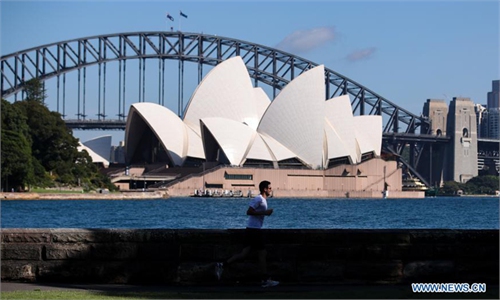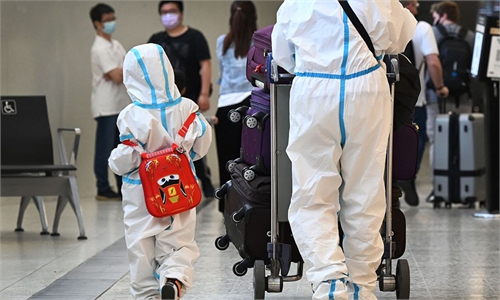Exclusive: Peak body of Aussie elite universities urges Canberra to refresh China policy, offer more incentives to attract Chinese students
'Actions speak louder than words' as Chinese experts call for actual measures

People welcome passengers from Singapore at Sydney Airport in Sydney, Australia, on Nov. 21, 2021. Australia's travel bubble with Singapore came into effect on Sunday.Photo: Xinhua
While the new government has yet to bring relief to the Australian education sector, which has suffered talent losses and financial stress during the pandemic, the peak body representing elite Australian universities has called on Canberra to recalibrate its China policy, given that Chinese students could be the "key to recovery."
Vicki Thomson, chief executive of the Group of Eight (Go8), which represents elite Australian universities, expressed her strong wish to boost connections with China in an exclusive interview with the Global Times.
Citing a report by The Australian newspaper, which called Chinese students the "key to recovery," Chinese observers pointed out that the loss of Chinese students was a great economic shock to Australia, which is suffering from severe stagflation.
But observers warned that although people from the education and business sectors in Australia couldn't wait any longer to repair ties with China, Australian policy-makers could be showing a lukewarm sincerity and motivation to improve scientific and educational exchanges.
"Currently, the majority of those students are studying at home in China, online. We look forward to welcoming them back as soon as possible," Thomson said in an e-mail to the Global Times on Wednesday.
"The new Australian government must recalibrate how it communicates with our valued international students. They are not a stopgap measure to fill low-wage vacancies, nor are they just a source of institutional and national revenue. They are the world's next generation of highly qualified professionals, for which there is an urgent skills shortage here and overseas," Thomson said, noting that Australia is faced with skills shortages in critical areas such as engineering, IT and the medical workforce.
Australia should be reviewing incentives to encourage international students to remain in Australia after completing their study - such as renewed visa settings "that allow our quality graduates to stay here and work if that's what they chose to do," Thomson suggested.
The Go8 chief executive elaborated on the benefits flowing from Chinese students spending time in Australia, calling them "far-reaching."
"It fosters mutual understanding and respect and much more. The collaborations borne out of our international partnerships lead to life-changing and lifesaving research, which impacts people around the globe," Thomson said, giving an example of the collaboration between Professor Eddie Holmes from the University of Sydney and Chinese colleague Professor Yong Zhen, who uncovered the genome sequence of the SARS-Cov-2 virus that causes COVID-19.
The Go8 chief executive on June 10 made a speech in Sydney, warning that Australia will "struggle to make economic headway" without the return of Chinese students.
Criticizing the former government's message of telling international students to go home as misguided and clumsy, Thomson urged the new government to refresh its policy toward China and admit the high value Australia receives from Chinese students and to "reflect the fact that the Go8 does not want our Chinese students treated as cash cows."
Australian universities are facing severe financial difficulties and have to reduce pay, cut teachers and employees, and drop some disciplines, said Yu Lei, chief research fellow at the Research Center for Pacific Island Countries of Liaocheng University, who listed some of the main factors that lie behind the strong wish from the Australian education sector to attract more Chinese students back.
Yu told the Global Times on Thursday that due to very limited government support, Australian universities have to raise nearly half of their funding, for which international students are important providers, especially Chinese students who once accounted for more one-third of all international students at most universities in Australia.
International education is Australia's fourth-largest foreign exchange earner, and China sends the most international students, Reuters has reported.
According to the data provided by the Australian Department of Education, Skills and Employment, there were 166,319 Chinese students in Australia in January-September 2021, dropping nearly 13 percent year-on-year. There were 190,926 and 211,965 Chinese students in Australia in 2020 and 2019, respectively.
Not only the pandemic but also the worsened China-Australia relations and the increasing hatred among locals in Australia toward China have contributed to the decreasing number of Chinese students in Australia, observers said.
The loss of Chinese students is a great shock to Australia's economy, which is suffering from severe stagflation, pointed out Chen Hong, director of the Australian Studies Centre at East China Normal University.
More than just boosting the international education industry by paying tuition, Chinese students have brought comprehensive economic benefits to Australia through hospitality consumption, travel, home buying and introducing their friends to study, Chen said.
As Chief Executive of the Go8, Vicki Thomson has a relatively fair and objective view of China-Australian educational cooperation and bilateral relations, Chen said, noting that the return of Chinese students could not only inject vitality into its flagging economy but provide an important bridge to narrow bias and promote mutual understanding.
Meanwhile, Chinese experts warned despite the strong call from Australia's universities, actual actions must be taken first to solve the existing problems that dissuade Chinese students from coming to the country.
Chen listed the guarantee of a safe study and living environment without racism, hatred or attack, the reopening of subjects such as engineering and bio-industry for Chinese students without application limitation, the end of crackdowns on bilateral cooperation in higher education institutions, and approval of visa applications and border entry.
"The current situation resulted from the former Australian government's COVID-19 border ban on Chinese students as well as the domestic hostility and violent attacks on Chinese students, which were triggered by some Australian politicians' hyping of China threat and smears on the 'China virus'", said Chen.
Australia hurried to shut its border to all foreign nationals travelling from the Chinese mainland from February 1, 2020, a day after the US' border restrictions on China.
Yu expressed concerns on the inaction of Australian politicians and people from the military and intelligence agencies, who rely on government finance. Since they are dependent on the US' support, they could lack the sincerity and motivation to repair China-Australian exchanges on scientific research and education or to improve the bilateral relations, Yu warned.




